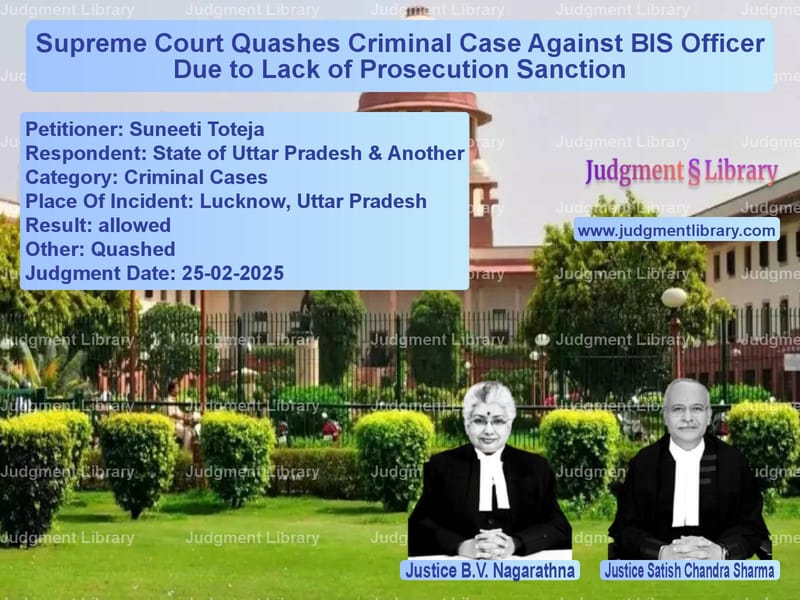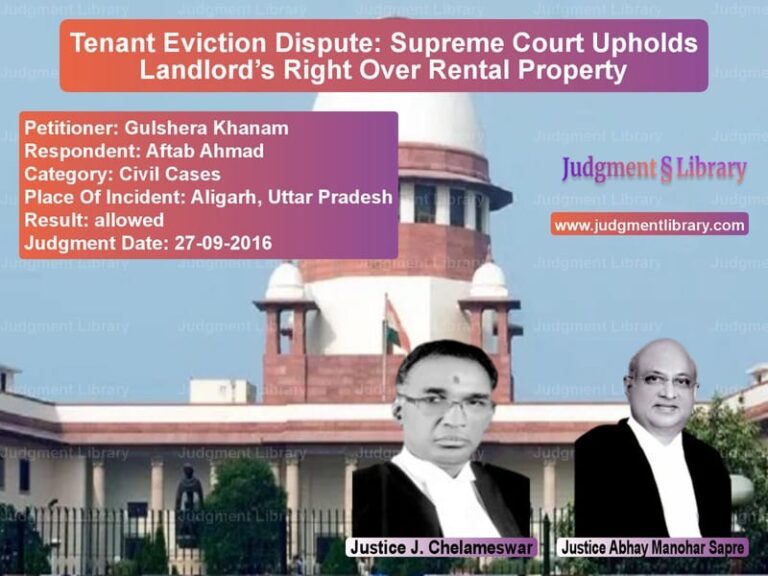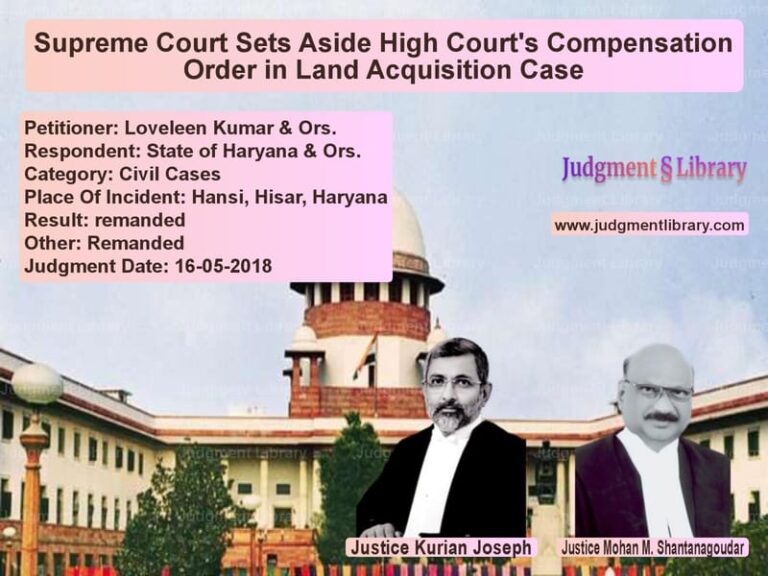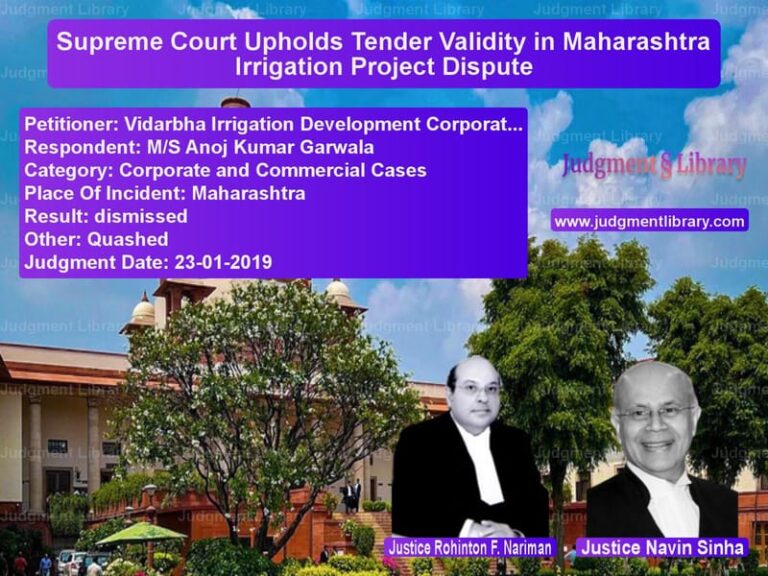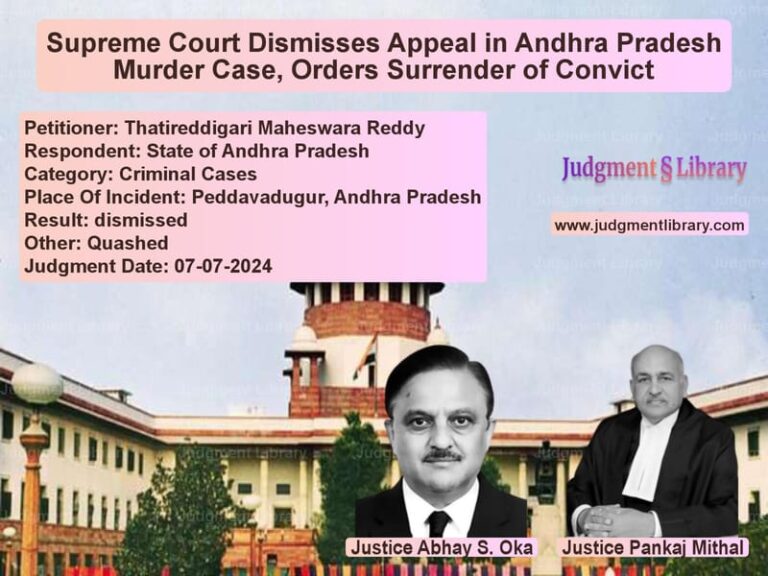Supreme Court Quashes Criminal Case Against BIS Officer Due to Lack of Prosecution Sanction
The Supreme Court of India has delivered a crucial judgment in the case of Suneeti Toteja v. State of Uttar Pradesh & Another, quashing a criminal prosecution against a Bureau of Indian Standards (BIS) officer due to the absence of mandatory sanction under Section 197 of the Code of Criminal Procedure (CrPC). This ruling clarifies the scope of protection granted to public servants and reaffirms the necessity of procedural compliance before initiating criminal proceedings.
Background of the Case
The case arose from an FIR filed by Dr. Manisha Narayan, a former Associate Director at the Food Safety and Standards Authority of India (FSSAI). The complaint alleged sexual harassment by Dr. S.S. Ghonkrorkta, an Enforcement Director at FSSAI, and subsequent procedural irregularities by officials handling the internal investigation.
The petitioner, Suneeti Toteja, a BIS officer on deputation at FSSAI from 2016 to 2019, was appointed as the Presiding Officer of the Internal Complaints Committee (ICC) after the original officer retired. She was later accused of filing a counter affidavit before the Central Administrative Tribunal (CAT) without the complainant’s knowledge, allegedly misrepresenting facts.
The complaint led to an FIR registered under various sections of the Indian Penal Code (IPC), including Sections 509, 120B, 192, 354A, 506, 202, 218, 204, and 197. However, no prior sanction for prosecution was obtained from the BIS, the petitioner’s parent department.
Key Legal Issues Considered
- Whether the prosecution of a public servant requires sanction under Section 197 CrPC when the alleged acts were performed in an official capacity.
- Whether the lack of sanction vitiates the trial proceedings against the petitioner.
- Whether the concept of “deemed sanction” applies when the competent authority does not respond within the stipulated period.
Petitioner’s Arguments
The petitioner contended:
- She acted in her official capacity as the Presiding Officer of the ICC and was merely defending the ICC’s findings in CAT.
- No criminal intent could be attributed to her for filing an affidavit in an administrative proceeding.
- The BIS, her parent department, explicitly refused to grant sanction for prosecution, rendering the trial proceedings void.
- The High Court failed to consider the mandatory nature of Section 197 CrPC before allowing the criminal prosecution to proceed.
Respondents’ Arguments
The State of Uttar Pradesh and the complainant argued:
- The delay in granting sanction effectively resulted in “deemed sanction,” allowing the prosecution to proceed.
- The petitioner misrepresented the complainant’s stance in CAT, violating legal and ethical duties.
- The magistrate had already taken cognizance, and any objections should be raised during trial proceedings.
Supreme Court’s Observations and Ruling
The Supreme Court ruled in favor of the petitioner, emphasizing that the lack of sanction for prosecution rendered the entire proceeding void. The Court made the following key observations:
- “Section 197 CrPC provides a statutory safeguard for public servants performing their official duties. Cognizance cannot be taken without prior sanction from the competent authority.”
- “The petitioner was acting in her official capacity as the Presiding Officer of ICC. Her actions were in furtherance of official responsibilities, requiring mandatory sanction before prosecution.”
- “The BIS, as the competent authority, explicitly denied sanction for prosecution, thereby nullifying the proceedings.”
- “The concept of deemed sanction does not exist under Section 197 CrPC. Failure to grant sanction within a time frame does not automatically translate into deemed approval for prosecution.”
- “The magistrate erred in taking cognizance without verifying whether sanction had been granted.”
Final Judgment
The Supreme Court issued the following directives:
- The criminal case against the petitioner was quashed.
- The chargesheet and summoning order were declared null and void.
- The High Court’s refusal to exercise its powers under Section 482 CrPC to quash the proceedings was overruled.
- The trial court was directed to drop all proceedings against the petitioner immediately.
Impact of the Judgment
This ruling has far-reaching implications for public servants and criminal law:
- Reinforces protection for public servants: Criminal proceedings cannot be initiated without proper sanction.
- Limits misuse of criminal law: Ensures officials are not targeted for actions performed in their official capacity.
- Clarifies “deemed sanction”: Establishes that lack of response from the sanctioning authority does not imply automatic approval.
- Sets a precedent for future cases: Ensures courts thoroughly examine procedural requirements before taking cognizance of cases against public officials.
Conclusion
The Supreme Court’s judgment in this case reinforces the fundamental principles of procedural fairness and statutory compliance in criminal law. By quashing the criminal proceedings against the petitioner, the Court has upheld the sanctity of Section 197 CrPC, ensuring that public servants are not subjected to unwarranted criminal trials without prior sanction.
Petitioner Name: Suneeti Toteja.Respondent Name: State of Uttar Pradesh & Another.Judgment By: Justice B.V. Nagarathna, Justice Satish Chandra Sharma.Place Of Incident: Lucknow, Uttar Pradesh.Judgment Date: 25-02-2025.
Don’t miss out on the full details! Download the complete judgment in PDF format below and gain valuable insights instantly!
Download Judgment: suneeti-toteja-vs-state-of-uttar-prade-supreme-court-of-india-judgment-dated-25-02-2025.pdf
Directly Download Judgment: Directly download this Judgment
See all petitions in Bail and Anticipatory Bail
See all petitions in Legal Malpractice
See all petitions in Judgment by B.V. Nagarathna
See all petitions in Judgment by Satish Chandra Sharma
See all petitions in allowed
See all petitions in Quashed
See all petitions in supreme court of India judgments February 2025
See all petitions in 2025 judgments
See all posts in Criminal Cases Category
See all allowed petitions in Criminal Cases Category
See all Dismissed petitions in Criminal Cases Category
See all partially allowed petitions in Criminal Cases Category

